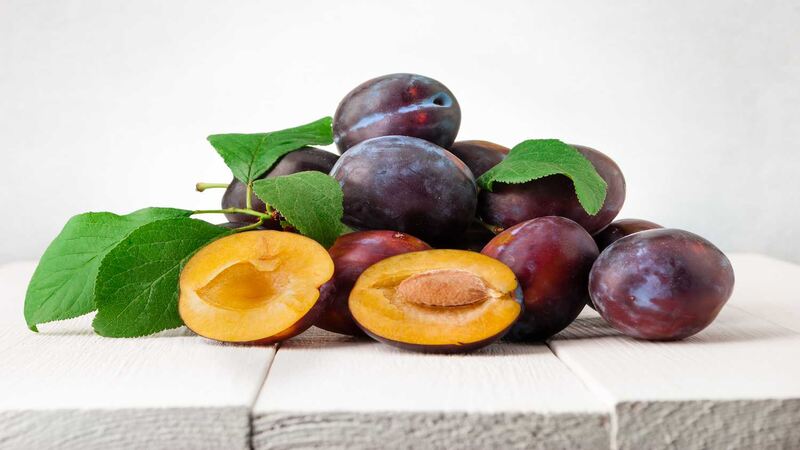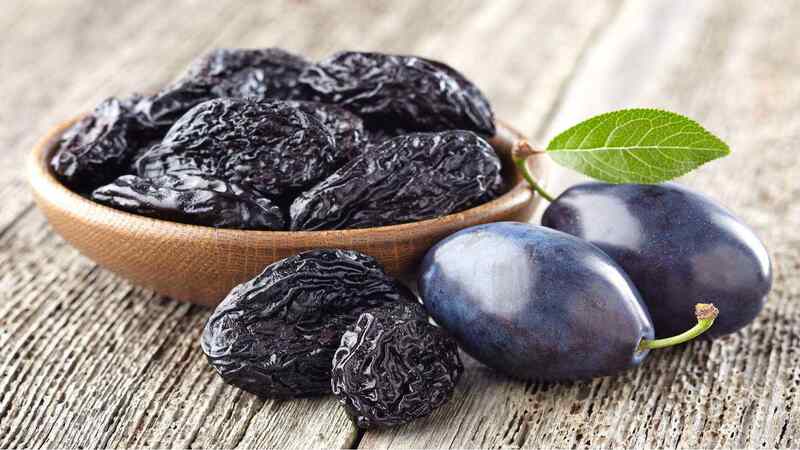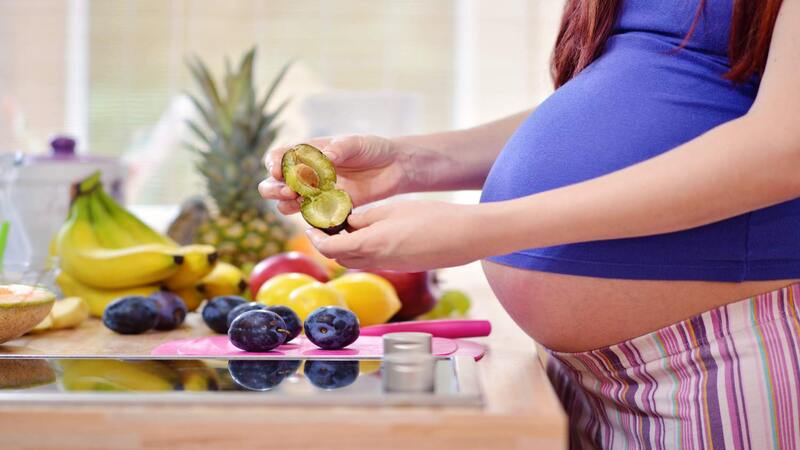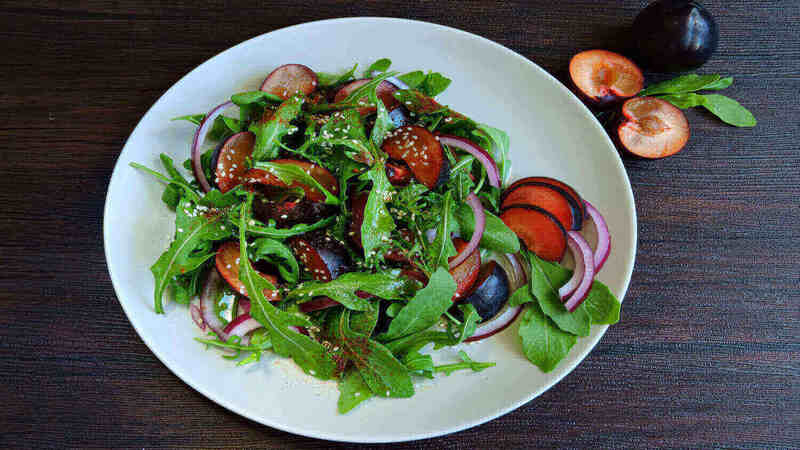
Prioritizing good health during pregnancy is essential for fostering the health of both the mother and the fetus. Incorporating a variety of fruits and vegetables, whole grains, wholesome bread, protein-rich sources, pulses, and dairy into your diet is crucial for a healthy pregnancy.(1). One fruit that offers numerous benefits during pregnancy is the plum. Plums are also known as aalu bukhara in some regions. Aalu Bukhara in pregnancy can provide essential nutrients that support a healthy pregnancy. In this article, we will explore the benefits of eating plums during pregnancy, how they can help with common pregnancy discomforts, and important tips to remember.
Video of Plums During Pregnancy
What Are Plums?
Plums are very colorful fruits that belong to the same family as the peach, the nectarine, and the apricot. They come in many shapes and sizes, with skin colors like red, purple, green, yellow, and orange and flesh colors like pink, yellow, and orange.
They are available in both fresh as well as dried forms. Dried plums are widely recognized as prunes. Prunes are an excellent addition to a healthy diet, as they are packed with essential nutrients and offer a delicious taste.
Eating Plums During Pregnancy

Plums are rich in vitamins C and K, which boost immunity and support bone development for mother and unborn baby. Their high fiber content aids digestion and helps prevent constipation during pregnancy. Additionally, plums contain antioxidants that protect the body from oxidative stress. However, consume them in moderation to prevent excessive sugar intake.
Plums during pregnancy are a good option because one can find sweet or sour plums, either juicy or dried, according to those taste buds that change as pregnancy progresses. Its small size makes it easy for pregnant women to carry in a bag and eat while traveling.
Note: It is crucial to consult your doctor before making any dietary changes during pregnancy. This ensures the best care for both you and your baby.
What is the Nutritional Value of Plums?
As mentioned earlier, eating plums during pregnancy can be very beneficial for both the mother and the fetus. These fruits are rich in essential nutrients like calcium, phosphorus, and carbohydrates, which are advantageous for the expectant mother.
Here are the nutritional facts of plums (2).
| Nutrients | Value |
|---|---|
| Water | 87.2 g |
| Energy | 46 kcal |
| Protein | 0.7 g |
| Total Lipid | 0.28 g |
| Ash | 0.37 g |
| Carbohydrate | 11.4 g |
| Total Dietary Fiber | 1.4 g |
| Calcium | 6 mg |
| Iron | 0.17 mg |
| Magnesium | 7 mg |
| Phosphorus | 16 mg |
| Potassium | 157 mg |
| Zinc | 0.1 mg |
| Vitamin C | 9.5 mg |
| Folate | 5 µg |
| Total Sugars | 9.92 g |
12 Amazing Benefits of Plums During Pregnancy

Incorporating fruits into your regular diet brings a wealth of benefits, benefiting everyone, including pregnant individuals. Specifically, adding plums to your diet during pregnancy can be particularly advantageous, as they support the health of both the mother and the developing baby in the womb. Embracing a variety of fruits like plums can enhance overall well-being during this important time.
Here are 12 amazing benefits of plums during pregnancy
1. Improves Immunity
Including plums in your diet during pregnancy can significantly support your immune system, thanks to their high vitamin C content. Vitamin C is essential for strengthening the immune system, helping your body effectively combat infections and illnesses. (3).
Furthermore, plums are packed with antioxidants that help protect the body from oxidative stress, promoting overall health. When consumed in moderation, plums can be a nutritious and immune-boosting addition to the pregnancy diet.
2. Help in Managing Gestational Diabetes
Gestational diabetes is a very common health complication that comes with pregnancy (4). Foods low in glycemic index are very good for such women. Plums can be beneficial in managing gestational diabetes when consumed in moderation. They have a low glycemic index, meaning they cause a slower rise in blood sugar levels, which is essential for managing blood sugar during pregnancy. (5). However, it’s important to monitor portion sizes and pair plums with other foods rich in protein or healthy fats to prevent spikes in blood sugar
[Read: Gestational Diabetes]
3. Helps to Regulate Blood Pressure
High blood pressure during pregnancy is common and can lead to preeclampsia. Having plums during pregnancy can help in regulating blood pressure (6), as they are rich in potassium.
4. Provide Energy
Plums can be an excellent source of energy during pregnancy. As your energy needs increase during pregnancy, adding plums to your diet can help meet those demands. Plums are packed with vitamins, minerals, and antioxidants, which can reduce fatigue and support your body’s functions, making it easier to cope with the challenges of pregnancy.
5. Relieve Constipation and Prevent Hemorrhoids
Dried plums, also known as prunes, act as a laxative and are very good for digestion (7). Pregnancy often causes constipation and putting pressure on your bowels is not advisable. Eating plums during pregnancy can ease such constipation episodes and smoothen out your bowel movements daily.
Hemorrhoids are a common issue faced by many expecting women. Regular intake of plums during pregnancy can prevent this uncomfortable condition and help the digestive tract work smoothly (8).
6. Prevents Preterm Labor
Plums are rich in magnesium, which helps to relax the muscles. Eating plums during pregnancy helps the cervical muscles to relax, thereby keeping early labor contractions at bay.
7. Good for Eyesight
Consuming plums during pregnancy and even otherwise can reduce your chances of developing retina degeneration and loss of sight.
8. Good for the Brain
Plums are rich in antioxidants (9) that can prevent your brain cells from oxidative degeneration, by protecting the lipid content (10). Plums can help with the “pregnancy brain” and also add to a healthy brain for the fetus.
[Read: Forgetfulness During Pregnancy]
9. Support Bones
A lot of calcium is required for the fetus to grow all those bones! Calcium tablets are prescribed right from the start of the pregnancy and even feeding mothers are advised to take them as letting the calcium levels drop in your body can lead to bone health issues in the future.
Eating plums during pregnancy can be a good source of calcium, Vitamin K, and D. Vitamin A is also a major constituent of a plum that helps boost bone growth and development. It even has potassium and phosphorus.
All these elements help to maintain the bone density of the mother (11) and in the development of the skeletal system of the fetus.
10. Helps Iron Absorption
Maintaining a good iron level is crucial during pregnancy. Pregnant women can get anemic, which can lead to many complications in the pregnancy. Consuming plums during pregnancy, which are rich in vitamin C can help your body absorb more iron (12) from all foods and thereby keep your hemoglobin levels in check.
11. Prevents Blood Clotting
Your blood tends to clot fast during pregnancy. This is your body’s way to limit blood loss during labor and delivery. However, blood clot formation during the gestation period can bring about several issues.
Consuming plums during pregnancy can increase the level of Vitamin K in your blood, which is known for preventing blood clots. In addition, studies stress the importance of plums in preventing blood clotting due to the presence of vitamin K (13).
12. High Fiber Content
A regular intake of plums during pregnancy can not only add nutritional value to your health but can increase your fiber intake too. The fiber content in this fruit (14) can satiate your hunger pangs for longer and help ease your bowel movements.
[Read : Fiber Rich Foods During Pregnancy]
Side Effects of Eating Plums During Pregnancy

The benefits of having plums during pregnancy are many; however, this fruit need not be a healthy addition always.
There are a few side effects too
1. Zero Calorific Content
Plums during pregnancy can be a great option for those who want to keep their weight in check. However, a pregnant woman has to include more calories than usual to help the fetus grow. The high fiber content in these plums can make you feel fuller for longer. This reduces your calorie intake, which may not be such a good idea after all.
2. Allergy Warning
Plums are very healthy, like any other food, but they can also cause allergies in some women. Plums belong to the Rosaceae family and fall under the “birch pollen” allergens category (15). Women with this type of food allergy must avoid plums at all costs, especially when pregnant.
Some of the symptoms that develop soon after consuming plums are a swollen mouth or throat, making it hard to not only eat but to breathe in some cases (16). Some women can feel an itch inside their mouths and throats. If you develop any of these allergies, stop eating the plums immediately and rush to a doctor.
Are Prunes And Aalu Bhukara the Same?
Prunes and aloo bukhara —both are dried plums! While “aloo bukhara” is the name commonly used in India, “prune” is what they’re called in the West. No matter the name, these little dried fruits pack a sweet and tangy punch. So You can include aalu bhukara in your pregnancy diet.
How Many Plums Can I Have in a Day During Pregnancy?
Plums provide ample health benefits for pregnant women. However, it is important to consult your doctor before including any new fruit in your diet. Since plums belong to the Rosaceae family, there are risks of allergies. You can consume up to 80g. This can be 2 small plums or one medium-sized plum.
When Should You Avoid Eating Aloo Bukhara?

Irrespective of their high nutritional value, there are a couple of situations in which you should avoid eating Aloo Bukhara during pregnancy
- Pregnant woman at risk of Kidney stones: Plums contain oxalates, which can increase the risk of kidney stones in some people. Therefore, pregnant women at risk of kidney stones should avoid them during pregnancy.
- Woman with gestational diabetes: Plums can cause mild increases in blood sugar levels, and large quantities can lead to spikes. This can be especially concerning for women with gestational diabetes.
- Pregnant woman with sensitive stomach: Plums are high in fiber and sorbitol, which can lead to digestive issues like gas, bloating, and diarrhea.
- When a pregnant woman is obese: Consuming large amounts of plums, particularly dried plums, can lead to weight gain due to their natural sugar content. This is concerning for pregnant women who are overweight or those struggling with weight reduction.
- If the pregnant woman has acidity issues: Plums can cause hyperacidity if eaten in excess. Pregnant women who already have acidity issues should avoid eating plums during pregnancy.
Tips to Eat Plums During Pregnancy
Pregnancy is a very crucial phase in a woman’s life. There are too many do’s and don’ts attached to the consumption of fruits and vegetables, which is dependent on the health conditions of pregnant women. Having an excessive amount of plums during pregnancy is not advisable as it can be harmful later.
So one should follow these guidelines to ensure balanced consumption
- It is advisable to consume fresh plums during pregnancy as they are more beneficial.
- As plums are high in natural sugars, consume some nuts and seeds along with your plums.
- These are rich in protein and will slow down the release of natural sugars from plums.
- Plums are nutritious, but their sole intake is not sufficient for calorie consumption.
- One should always take other supplements to suffice the need.
- Check with your doctor for any doubts regarding eating plums during pregnancy.
How Do I Eat Plums During Pregnancy?

Wondering how you can eat plums during pregnancy? Here are a few ideas:
- You can eat them fresh and raw to relish the juicy fruit completely.
- Have it as a snack whenever you feel like popping something in your mouth. Plums are any day a better option than some random junk.
- Include a few pieces in your morning or midday salad. This will give that sweet and sour touch to your salad bowl.
- Add prunes to your morning cereal. This way, you can have a juicy bite of fruit now and then while eating your chunky cereal.
- If you are craving something cold all the time, you can make popsicles. Juice the plums and make popsicles out of them for a quick “cold shot”.
- You can also add them to your fruit custard or a trifle pudding if you like to have cold plums during pregnancy.
- If you are an oats fan, you can have a couple of plums along with your oats.
- If you like granola, add a few plums into your granola for a juicy bite here and there.
- You can add a sweet variety of plums to your smoothies too.
- Increase your water intake by adding a plum or two to a bottle of water, thus adding flavor to it.
- Add some to your porridge for a healthy breakfast.
A balanced diet is essential during pregnancy. Whether you are consuming plums during pregnancy or are following a strict diet plan, ensure it is well balanced with all your other foods. Listen to your body and if you suspect any allergic reaction or feel a certain food is not suiting you, avoid it. Never hesitate to seek medical and professional help. No matter if research says a particular food is good for pregnancy, always get it approved by your doctor.
FAQ’s
1. Can I Eat Plums Every Day While Pregnant?
Plums are rich in antioxidants and other vital nutrients that are important for a healthy pregnancy. Having plums in moderation in your everyday diet can help you sail through a healthy pregnancy. However, consult your doctor before you include plums in your diet.
2. Can I Eat Plums When Constipated?
Plums are rich in fiber content and can greatly help relieve constipation. Opt for the dried variety as it has a more laxative effect than the fresh ones.
3. Do Plums Have Folic Acid?
Yes, plums contain folic acid in them. Folate is an essential nutrient required for both pre-pregnancy and early pregnancy stages. Having enough amount of folate can avoid neural tube defects in babies.
4. Is Plum High in Sugar?
Despite the carbs content in plums, their low glycemic index helps control blood sugar levels. Plums are rich in essential vitamins, minerals, antioxidants, and fiber.
References
- The importance of nutrition in pregnancy and lactation: lifelong consequences – [https://www.ncbi.nlm.nih.gov/pmc/articles/PMC9182711/]
- Plums, raw – [ https://fdc.nal.usda.gov/food-details/2709265/nutrients ]
- Functional constituents of plant-based foods boost immunity against acute and chronic disorders – [https://www.ncbi.nlm.nih.gov/pmc/articles/PMC9462539/]
- Prevalence and risk factors of gestational diabetes mellitus in Asia: a systematic review and meta-analysis – [https://bmcpregnancychildbirth.biomedcentral.com/articles/10.1186/s12884-018-2131-4]
- Snack selection influences glucose metabolism, antioxidant capacity and cholesterol in healthy overweight adults: A randomized parallel arm trial – [https://www.ncbi.nlm.nih.gov/pmc/articles/PMC7184323/]
- Use of prunes as a control of hypertension – [https://pubmed.ncbi.nlm.nih.gov/21409897/]
- Systematic review: the effect of prunes on gastrointestinal function – [https://pubmed.ncbi.nlm.nih.gov/25109788/]
- Investigation of Dried Plums in Constipation – A Randomized Controlled Trial – [https://journals.lww.com/ajg/fulltext/2009/10003/investigation_of_dried_plums_in_constipation___a.1328.aspx]
- Antioxidant potential of different plum cultivars during storage – [https://www.sciencedirect.com/science/article/abs/pii/S030881461301337X]
- Neuroprotective Effect of Antioxidants in the Brain – [https://www.mdpi.com/1422-0067/21/19/7152]
- Dried Plums, Prunes and Bone Health: A Comprehensive Review – [https://www.mdpi.com/2072-6643/9/4/401]
- INTERACTION OF VITAMIN C AND IRON – [https://pubmed.ncbi.nlm.nih.gov/6940487/]
- Plums: A Brief Introduction – [https://www.researchgate.net/profile/Saurabh-Patel-12/publication/316514807_Plums_A_Brief_Introduction/links/5901d66baca2725bd721b806/Plums-A-Brief-Introduction.pdf]
- Plum pomaces as a potential source of dietary fibre: composition and antioxidant properties – [https://link.springer.com/article/10.1007/s13197-011-0601-z]
- Rosaceae food allergy: a review – [https://www.tandfonline.com/doi/abs/10.1080/10408398.2022.2045897]
- Detection and clinical characterization of patients with oral allergy syndrome caused by stable allergens in Rosaceae and nuts – [https://www.sciencedirect.com/science/article/abs/pii/S1081120610628347]
Read Also: Peaches During Pregnancy

